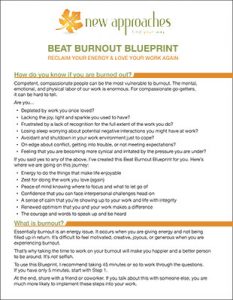What comes to mind when you think of burnout?
We can often identify burnout when it has already happened:
- Real fatigue
- Complete lack of motivation
- Decrease in productivity
- Attitude change that is noticeable to colleagues or our family members
Beating burnout, however, requires that we catch it well before it becomes a real threat to our well-being.
A key to having some balance between work and personal is being proactive in catching burnout when begins to form—not when it’s about to sink us.
What is burnout?
When I talk about burnout, the thing I’m thinking about is energy. In my definition, burnout is about expending more energy than we are creating.
That’s the first clue: burnout isn’t about some objective measure like number of hours worked or numbers of tasks you complete.
It’s an energy debt.

Get your blueprint to beat burnout
Competent, compassionate people can be the most vulnerable to burnout. The mental, emotional, and physical labor of our work is enormous.
Fortunately, you can change your relationship to work so you have more energy and love your job again. Get the five steps to beat burnout.
Identifying burnout before it happens
If we can identify burnout early, then you have a better chance of preventing it.
Since burnout is all about energy, make a regular habit of checking in with yourself and taking account of your energy. Notice the first evidence of burnout. How does it effect your energy level?
Here’s how I notice it:
- I find that it can creep into my life easily and quietly.
- I start to notice where I’m not being as effective.
- I notice it when I get home and I’m annoyed that my kids are being kids—because I have nothing left to give.
- I notice that things are taking me longer to do.
- I’m irritable.
- I’m mildly resentful of anyone who wants anything.
It’s frustrating to feel like you have to dig into your reserves just to do something normal, like washing the dishes at the end of the day.
Frustration with something like that tell us we didn’t leave enough energy.
A lot of people tell me they notice they start to do things mindlessly, like scrolling through social media, or get easily distracted. Some people talk about eating, especially sweets.
It’s like we are searching for an energy boost from something with can watch, connect with, or simply from glucose.
Those are signs.
I want you to take a minute and think about what your signs are.
- What do you do when you are about ready to hit an energy deficit?
- What do you look like?
- What do you act like?
If you are like me, you are probably not your best self.
Our burnout impacts other people, because we can’t give from a place of energy deficiency.
That’s why it’s absolutely NOT selfish to take time to take care of you. No one else can know your burnout and what you need. Burnout is individual.
Taking action
That brings us to today’s ACTION STEP.
Our first line of defense with burnout is simple self-reflection. It’s really foundational to all wellness. We cannot skip paying attention to our own selves.
This week I want you to think about two or three times during your day where you can check in with yourself.
Examples can be as you commute to and from work or during lunch time. It could also be other times of transition when you have a moment to breathe. Considering checking in with yourself during bathroom breaks. Or on a walk to the other room for a snack break.
One of the best sources of information is your body. Do you feel tense? Do you feel tight? See if you can get out of your thoughts and just be an observer to your body. See what you notice without judgement.
Interested in learning more about burn out and how to address it?
Join my small group coaching program specifically for professionals who give a lot but are ready to reclaim their energy and love their work again (while not losing their big hearts!).
You’ll get the information and support to find your individualized path back to feeling energized and having the exact skills (and even scripts!) to use to manage your energy, be clear on your priorities, and have the words to say anything you need to say in your workplace.
Learn more and sign up  Hannah Curtis is a communication coach who teaches purpose-driven people how to use their words with confidence and their power for positive change.
Hannah Curtis is a communication coach who teaches purpose-driven people how to use their words with confidence and their power for positive change.


0 Comments